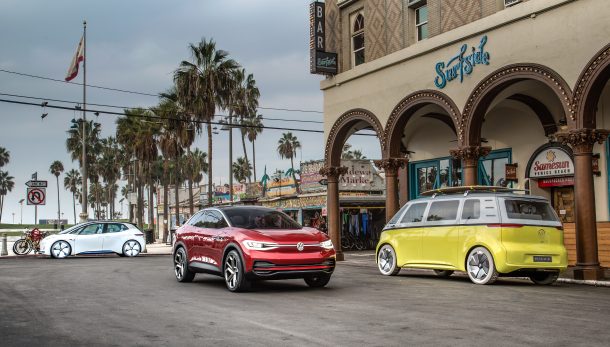Volkswagen's Not Ruling Out an Electric Tie-up With Ford

Pretty much everything is on the table at this point. At least, that’s the way it looks to industry observers. The partnership announced between Ford and Volkswagen back in June has the potential to birth any number of outcomes — from jointly developed commercial vehicles (the initial aim), to badge-swapped overseas small cars, autonomous vehicle hardware, and perhaps even borrowed electric vehicle architecture.
As it prepares the launch of its MEB-platform electric vehicles, Volkswagen’s not saying “no” to letting Ford have a piece of the action.
Of course, it’s not saying “yes” either. Speaking on a conference call Tuesday, Volkswagen chief financial officer Frank Whitter said the company is open to new hookups, Automotive News reports, but wouldn’t say whether or not its MEB architecture would ever be up for grabs.
“Whether we might provide access to other brands outside of the VW Group is theoretically possible, but there is no decision,” Whitter said.
Having access to VW’s EV architecture would be a cost-saving boon for Ford, which begins its electric product push with the release of a sporty crossover in 2020. At this year’s Detroit auto show, Ford announced plans to release 40 electrified models by 2022, 16 of which would be fully electric. To do this, the automaker will spend $11 billion.
VW’s first MEB vehicle, a compact hatchback, starts production in November 2019. Following that, a crossover and reborn Microbus appear, with production eventually leaving Germany for the U.S. and China. Those latter two models likely have a home in Tennessee.
All told, VW aims to build 10 million electric vehicles using its new architecture. One of the brand’s main areas of focus is the Chinese EV market — a cash-rich cornucopia of state-incentivized green vehicle buyers. It’s a market Ford, which saw its Chinese operations hit a towering roadblock in recent months, would definitely like a larger slice of.
Platforms aside, Whitter said VW is eagerly looking to lower future costs by partnering with big players in the autonomous driving field.
“It’s no secret that this is very expensive to develop and that there is the one or the other that is far ahead, such as Waymo in the U.S., so we are naturally thinking about how we can narrow the lead. Or if this isn’t feasible, how we can strengthen our own activities,” Whitter said. “There’s no final decision.”
[Image: Volkswagen]

More by Steph Willems
Latest Car Reviews
Read moreLatest Product Reviews
Read moreRecent Comments
- Redapple2 Love the wheels
- Redapple2 Good luck to them. They used to make great cars. 510. 240Z, Sentra SE-R. Maxima. Frontier.
- Joe65688619 Under Ghosn they went through the same short-term bottom-line thinking that GM did in the 80s/90s, and they have not recovered say, to their heyday in the 50s and 60s in terms of market share and innovation. Poor design decisions (a CVT in their front-wheel drive "4-Door Sports Car", model overlap in a poorly performing segment (they never needed the Altima AND the Maxima...what they needed was one vehicle with different drivetrain, including hybrid, to compete with the Accord/Camry, and decontenting their vehicles: My 2012 QX56 (I know, not a Nissan, but the same holds for the Armada) had power rear windows in the cargo area that could vent, a glass hatch on the back door that could be opened separate from the whole liftgate (in such a tall vehicle, kinda essential if you have it in a garage and want to load the trunk without having to open the garage door to make room for the lift gate), a nice driver's side folding armrest, and a few other quality-of-life details absent from my 2018 QX80. In a competitive market this attention to detai is can be the differentiator that sell cars. Now they are caught in the middle of the market, competing more with Hyundai and Kia and selling discounted vehicles near the same price points, but losing money on them. They invested also invested a lot in niche platforms. The Leaf was one of the first full EVs, but never really evolved. They misjudged the market - luxury EVs are selling, small budget models not so much. Variable compression engines offering little in terms of real-world power or tech, let a lot of complexity that is leading to higher failure rates. Aside from the Z and GT-R (low volume models), not much forced induction (whether your a fan or not, look at what Honda did with the CR-V and Acura RDX - same chassis, slap a turbo on it, make it nicer inside, and now you can sell it as a semi-premium brand with higher markup). That said, I do believe they retain the technical and engineering capability to do far better. About time management realized they need to make smarter investments and understand their markets better.
- Kwik_Shift_Pro4X Off-road fluff on vehicles that should not be off road needs to die.
- Kwik_Shift_Pro4X Saw this posted on social media; “Just bought a 2023 Tundra with the 14" screen. Let my son borrow it for the afternoon, he connected his phone to listen to his iTunes.The next day my insurance company raised my rates and added my son to my policy. The email said that a private company showed that my son drove the vehicle. He already had his own vehicle that he was insuring.My insurance company demanded he give all his insurance info and some private info for proof. He declined for privacy reasons and my insurance cancelled my policy.These new vehicles with their tech are on condition that we give up our privacy to enter their world. It's not worth it people.”


































Comments
Join the conversation
"Electric tie-up"? And I thought Bertel Schmitt had moved on.
The Tesla Effect: An Elon Musk Adventure